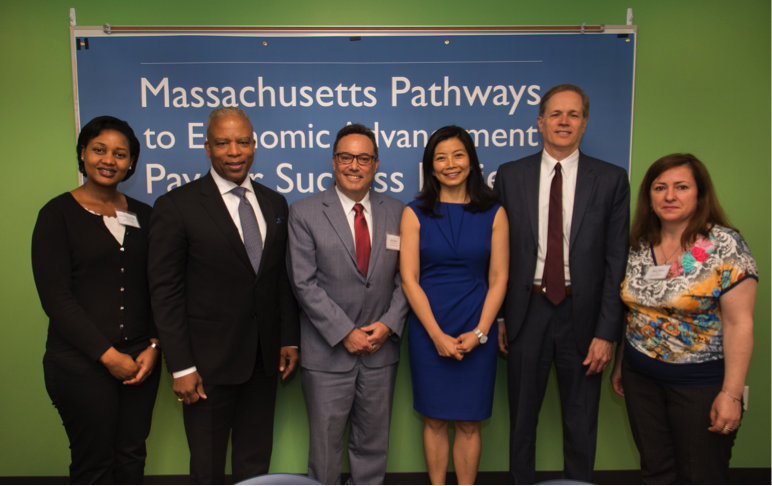Every day social innovators and social innovation organizations across the country are measurably impacting communities and individuals. This Practice to Policy blog series lifts up the voices of the more than 70 organizations that make up the America Forward Coalition and our broader social innovation network by highlighting their outcomes-based solutions to our country’s most pressing social problems and why these solutions must be reflected in our federal policies. Today we will hear from America Forward Coalition members Social Finance and Jewish Vocational Service about how access to administrative data can have a transformative effect on service providers and governments.
It is estimated that only 1% of spending by the government is backed by evidence. The vast majority of expenditures for social programs then go to outputs rather than to outcomes achieved. For adult education, this means that nonprofit service providers are often measured on (and therefore are incentivized to focus on) classroom hours attended or the number of students enrolled rather than on successful attainment of stable employment or higher paying jobs for their students.
At the same time, service providers often find themselves devoting extensive resources to collect data that the government already collects on important outcomes like job placements, homeless shelter entrance and exits, benefits utilization, and college graduations. This duplication of effort takes staff time and resources that could otherwise be devoted to improving service delivery for those in need.
There is an opportunity to accomplish two things simultaneously by tapping into the rich administrative data that government has gathered for decades. Advances in technology have made that data both more robust and more accessible. Through models like Pay for Success, governments and service providers can work together to put this data to work to make a meaningful impact in our communities.
The Massachusetts Pathways Pay for Success Project
In early 2017, the Commonwealth of Massachusetts, Jewish Vocational Service (JVS Boston), and Social Finance launched the Massachusetts Pathways to Economic Advancement Pay for Success Project. With $12.43 million in private investment, the project increases access to vocational English classes, skills training, and better jobs for approximately 2,000 immigrants and refugees in Greater Boston. The public, private, and social sector partners are focused on supporting successful transitions to employment, higher wage jobs, and higher education for participants. Should the project achieve pre-determined metrics on earnings and other outcomes, the Commonwealth of Massachusetts will repay investors based on the level of project performance.

Immaculate Nabuule, Secretary Ronald Walker, JVS Boston CEO Jerry Rubin, Social Finance CEO Tracy Palandjian, Secretary Jim Peyser, and Alketa Briskaj at the launch of the Massachusetts Pathways to Economic Advancement Project, June 2017
Building the Base
Designing the Massachusetts Pathways to Economic Advancement Project relied in part on a deep understanding of the historical earnings outcomes of JVS service recipients. While Massachusetts chose to partner with JVS for its strong operational track record, neither JVS nor Massachusetts had yet been able to track participants over time to understand the impact of JVS services on clients’ future earnings.
In order to inform expectations for future program success, it was necessary to retrieve historical data. The Social Finance team designed an analytical engine – a template onto which government could easily place existing historical data – which then automatically generated a report describing earnings history for anonymized JVS participants in aggregate, which gave external partners access to rich administrative data without revealing information attributable to individual participants.
During the six-year implementation of the project, the Commonwealth of Massachusetts will provide regular access to individualized administrative wage and higher education data through the Department of Unemployment Assistance and the Department of Higher Education to project partners with expertise in handling sensitive data with the appropriate security and confidentiality provisions. This data will inform measurement of outcomes to trigger repayments to investors, as well as contribute to broader policy learning on what works in workforce development for the adult learner population in Greater Boston.
Freeing the Data
As highlighted in a recent SSIR article, and notable in the emergence of initiatives like What Works Cities and BrightHive, there is a richness in administrative data gathered by governments that can offer valuable insights into the efficacy and impact of programs. Administrative data is a largely untapped source of information on participant outcomes. There is an incredible opportunity for policy change on administrative data sharing to have an impact on the way social programs are delivered, measured, and procured. There already appears to be some movement for federal policy change, with Congress passing the Foundations for Evidence-Based Policymaking Act at the end of last year. The legislation, which now awaits Senate action, aims to improve the secure use of administrative data to inform policy decisions. Access to individual, de-identified administrative data for service providers and others would be incredibly valuable for those working to improve outcomes for vulnerable populations. The benefits of increased access to administrative data are clear: these data cost much less to collect than administering new surveys, they do not place an additional burden on service providers or respondents, and they enable long-term assessment (which is nearly impossible to achieve with disenfranchised populations that often move, change phone numbers, etc.).
The Massachusetts Pathways PFS project is a pioneering example of how multi-year administrative data access can empower providers to customize service delivery to client needs, and infuse an outcomes focus into our workforce systems. The approach taken in Massachusetts represents a scalable win-win-win for service providers, governments, and communities. The sharing and analysis of administrative data helps service providers deliver more targeted and effective programs; improves government insight and selection in their service array; and increases access to the best services for individuals and communities.
Leave a Reply
You must be logged in to post a comment.